 Churches of Christ & Christian Churches in the Pacific Northwest THE COLLEGES founded after 1898 |
 The Light Still Burns College Index
|
Boise Bible College | Cascade | Central Washington Bible College
"Moscow" | Northwest College of the Bible | NCC - Pullman | NCC - Seattle
Next Chapter . . . Pioneer Menu . . . Search
This is a strange entry in our history. We do not have a name for this school that lasted briefly in Moscow, Idaho. At one time it had 70 students and met in rented facilities. It was headed by E. R. Black, an 1889 graduate of Bethany College.
The Moscow school began in 1909. It is reasonable to think that many of the students transferred to the better-funded Spokane University when it opened in 1912.
By 1929, The Christian Standard reported that Mr. Black was on the faculty of Pacific Bible Seminary -- currently Hope International University. Mr. Black was in charge of the Department of New Testament.
NCC - Pullman Map
The same year Mr. Black began at Moscow, Northwest Christian College of Eugene, Oregon launched a satellite campus at nearby Pullman. NCC professor Elmer M. Patterson was in charge of the program. It was positioned near the campus of the Washington State University and was called the Pullman Bible Chair.
Spokane University Map
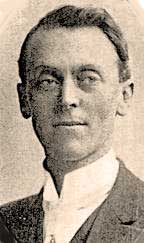
|
B. E. Utz had attended Butler College and received his M. A. from Drake University in 1895. He also did post-graduate work at the University of Chicago and earned his A. M. degree from Drake. He taught at Eugene Bible University as well as ministries in Yakima and Spokane's Central Christian Church.
Mrs. Utz also attended the University of Chicago and graduated from Drake University in 1896. She spent most of her remaining years as Librarian at Spokane University.
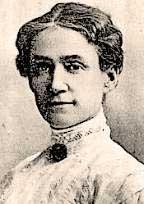
|
Though we cannot trace them now, several early writers say there were eighty churches within reach of Spokane and less than half that number had preachers. The first year school was held at the corner of Sixth Avenue and Stevens Street in downtown Spokane. One writer says "The school proved its worth when, after only one year, it sent out 18 student ministers to preach and conduct Sunday School."
The next year fifteen regents were selected and a charter was secured for Spokane University. Through the influence of O. A. Adams, one hundred sixty acres were acquired east of town on an elevated slope under pine trees. The purchase was funded by the Waitsburg Church. Later, the University occupied 33 of these acres. B.E. Utz died three weeks into the first semester at the new location. Overwork?
Though more than 80 years ago, we can still feel the thrill as a great crowd came to meet under the pine trees, dedicating the site and breaking ground for the first six room building.
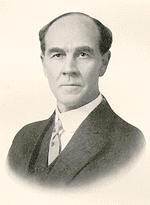
|
Others heading the school were A. M. Meldrum, Chester V. Dunn, and Roy K. Roadruck. The school was affiliated with, but not funded by, the Disciples of Christ.
At the passing of founder B. E. Utz in 1913, Ortis Harris, speaking for the students said:
No one person was responsible for the evangelistic spirit of Spokane University. On Friday afternoons the preachers who were going out for the weekend assembled and placed their sermon outlines on the blackboard. Criticisms and recommendations were shared. Saturdays and Sundays were spent with the churches and Monday afternoons they assembled again to report their failures and successes.
Faculty members gave much inspiration and aid in growing churches and helping students plant new ones. One later student said,
Though gone from the scene, the Spokane University name continues in such local landmarks as University Road, University Elementary School, University High School and University City Shopping Center.
Pioneer Reminders: University High School, Redford Hall, the Science Hall (Sunshine Terrace Boarding Home) and the street name - University Place.
Note: Much of this research was done by Carol Rodda of Tampa, Florida and we thank her for it.
The records and library from Spokane University were moved to Northwest Christian College in Eugene. They may be examined by appointment.
Seattle - NCC
Map
Little is known about the extension of Northwest Christian College of Eugene into the Seattle area. According to historian Clarence Swander, the effort was launched on April 24, 1919. If it follows the pattern set by Dr. E. C. Sanderson in other communities, it was located in the University District. It was his goal to start Bible-teaching institutions adjacent to state schools. The extension school did not survive.
Cascade College link
Map
First known as Columbia Christian College, Cascade College in Portland is a liberal arts school connected with the a capella Churches of Christ. Check their Web site for extensive details.
Northwest College of the Bible link
Map
The focus of NCB is the development of vocational Christian leaders. In 2003 the school was able to eliminate its tuition fee. This enables leaders to graduate without indebtedness to the school. A graduate is able to go directly to the mission field instead of working a few years in order to pay off the cost of his or her education.
The college started in the Fall of 1945 at the First Church of Christ in Boise and remained under the leadership of the elders until the mid-1970's.
Today BBC occupies its own growing campus at the edge of Boise. Learn more at their web site.
PSCC, established in 1950, is a conventional, independent bible college based at Mountlake Terrace, Washington. Its constituent churches are mainly, though not exclusively, Churches of Christ and Christian Churches in Oregon and Washington.
The Board of Trustees has announced the closing of Puget Sound Christian College.
This school began at Thorp, Washington in 1948. A photo of the church building is located on this link.
The school operated two years under the direction of Donald N. Rickerson, then of Zillah, Washington. All classes and assemblies were held in the building at Thorp until it was destroyed by fire in the Spring of 1950.
The school reopened at Selah in the Fall of 1951 under the direction of Hervy Abercrombie, Teddy Leavitt, Fred Hoy and David Vaughn. Mr. Abercrombie was also selected as the minister of the Selah Christian Church.
Over time, the teachers were Abercrombie, Bruce Caldwell, Clinton Chittock, Judson Cornwall, Scott Bilderback, Carl Whitehead and Fred Neth. Teddy Leavitt was considered the "father" of the school.
Lenard Hovde of Castle Rock has provided a photo of an early graduation showing both faculty and graduates.
Closed for lack of financing: Bethel, McMinnville, Christian at Monmouth, Spokane University, Central Washington Bible College at Selah and briefly, Columbia Christian College plus a school at Moscow, Idaho. In California the schools at Santa Rosa, Woodland, College City and Irvington met the same end.
Add to the list in 2007, Puget Sound Christian College and in 2009 Cascade College.
The school that survives the longest is the one with the best fund raisers, not the most effective in accomplishing its goals. Highly qualified school presidents are selected, not to teach in the classroom, but to be public relations men and fund raisers.
Northwest College of the Bible, now tuition free, is positioned to survive without outside income. It can function much better and recruit students with outside financial help, but it can survive without it, too. It should not face the same financial fate as some of those of the past.
The long term solution is to put the college of your choice in the church budget as a line item. Stop the financing by crisis that now exists. Recently I handed a check to a Bible College representative where the school was experiencing a financial crisis. In less than six weeks another crisis had happened and I was again asked to contribute. I did not contribute again and probably will not in the future.
Life in a school is seldom exciting when compared with the mission fields. There are no starving babies being fed, no villages turning to Jesus - just men learning the Word of God and how to apply it. When they are properly educated, they will go forth to do the exciting things. Let us determine to fund this all-important work of education properly and stop funding-by-crisis. Let's learn from our history.)
Now we begin the counties in Oregon:
The work of founding this university was great, but greater than that is the legacy in the influence he planted in our hearts. As a teacher he was all that could be desired - patient with us in our weakness, gentle with us in our troubles. He was more than a teacher, he was a father and we loved him as such. We could go for counsel and advice - not only about school but also our personal problems. The influence he planted will be reflected in our lives in helping and uplifting others and furthering the Kingdom of God.
Mr. and Mrs. Utz had been on the faculty at present-day Northwest Christian College in Eugene before their time at Spokane. The schools had been closely linked by NCC personnel going to Spokane. Another case was that of Frank E. Billington. After preaching at Silverton, Oregon, he joined the faculty at NCC, then called the Eugene Bible University, in 1909. From 1914 - 1916 he taught at Spokane University before moving to Texas Christian University.
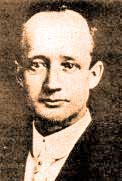
"I was not connected with the school in the early days and did not experience the mental exhilaration - the ecstasy of the pioneers, but I hear of them from the lips of persons who described the early days in rapt tones of those who had seen a vision. The halo of that vision carried through the twenty-odd years of the institution's existence and still glows in the hearts of men and women who trod the campus."
A Science Hall and Gymnasium were also constructed. The Science Hall is now The Sunshine Terrace Boarding Home.
The school operated until 1933 when it failed financially and was merged with the Eugene Bible University (Northwest Christian College). During its years of existence, it graduated 223 students and served hundreds of others.

at Spokane University
Photo courtesy of Northwest
Christian College Library
Also in Portland is tiny Northwest College of the Bible.
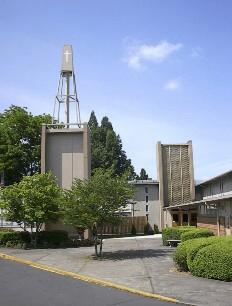
is part of Central Christian Church
NCB is where this author teaches. Click on the NCB Web site for off-campus classes and general information.
Boise Bible College resulted from an evangelistic meeting held in Boise by young evangelists led by Orin Hardenbrook. From this meeting it was concluded that there was a need for a school to prepare men to start churches in the sparsely populated region between the Rockies and the Pacific Coast.

Central Washington Bible College
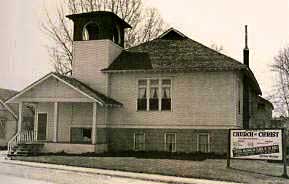
once home to Central Washington
College of the Bible.
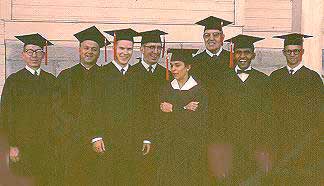
Woodworth, Hervey Abercombie, Bruce Caldwell.
Front: Annie (Thoma) Pallai, Joy Devesia, Scot Bilderback
(Editorís Comments: The history of Christian higher education among the Churches of Christ and Christian Churches in the Pacific Northwest holds some valuable lessons.
Baker County or back to Pioneer Menu
